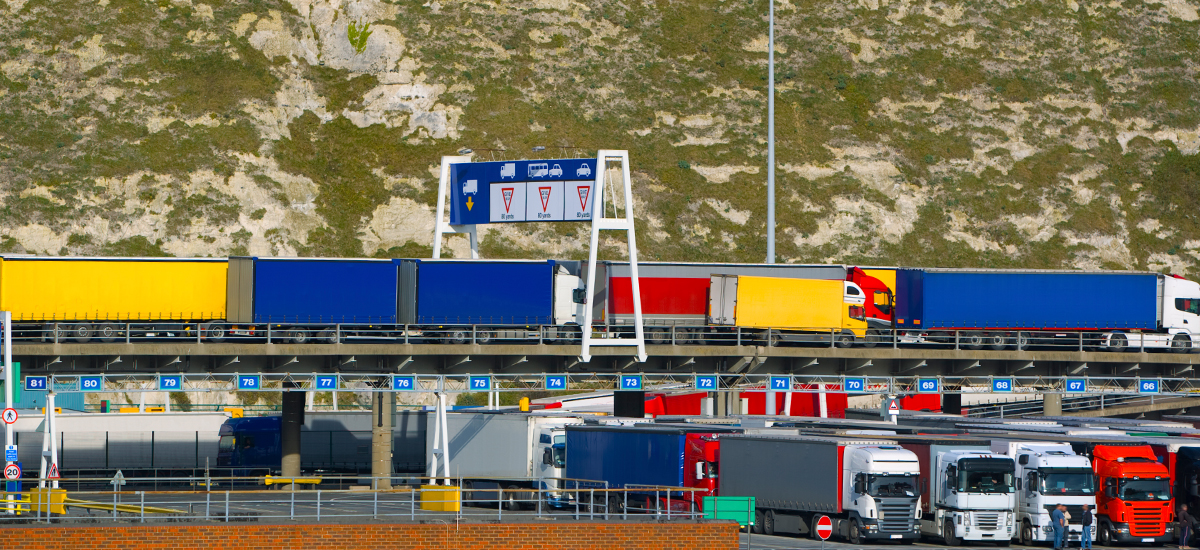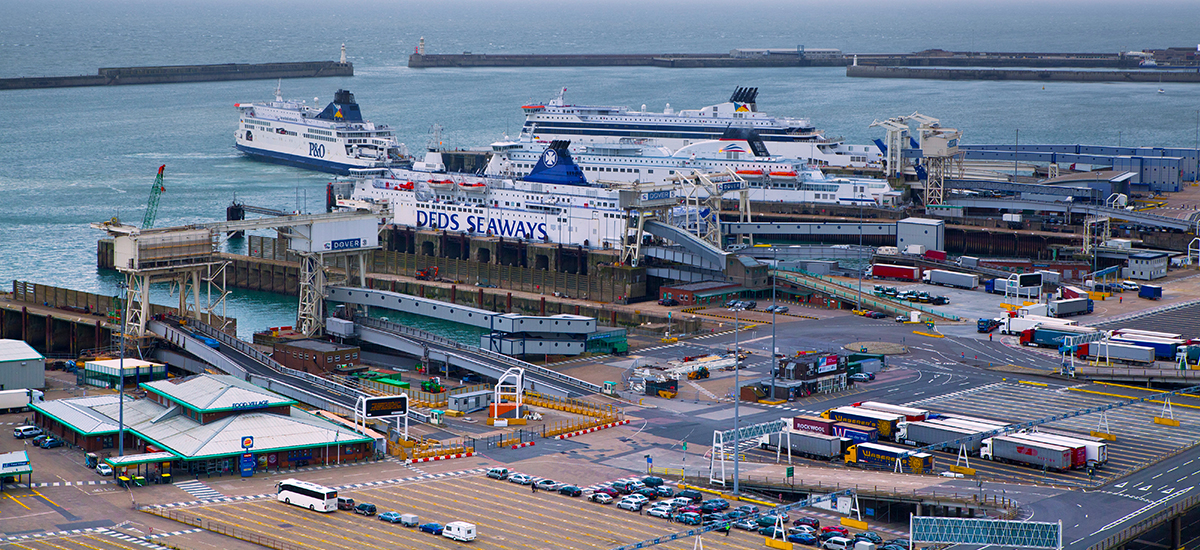The language of this website is controlled by the settings of your browser. You can select other languages via "Change"!
Making the best of Brexit
Around 200 trucks loaded with foodstuffs depart from Herne Logistics Center every day. In the wake of Brexit, increasing numbers of vehicles are heading for the UK with its new “third country” status. DACHSER Food Logistics has the consequences of Brexit firmly under control, thanks to the sophisticated range of complex services it provides.

“Even after Brexit, our temperature-controlled food transport routes to the UK still arrive at their destinations after 48 hours––the same as they did before,” says a satisfied Dirk Alexander, Sales and Service Manager at DACHSER in Herne. The location in Germany’s Ruhr region serves DACHSER Food Logistics as a hub for all networked transport routes to and from the United Kingdom. The positive news is a surprise, given the often chaotic situations reported from border crossings as the effects of the coronavirus pandemic are compounded by a slew of new customs regulations. True, doom-laden predictions of kilometer-long traffic logjams in the south-east of England have largely gone unfulfilled (apart from those caused by the exceptional circumstances under Covid-19); however, this is largely because producers in the UK have cut––or even halted––their deliveries to the UK due to the new customs laws accompanied by soaring customs duties and transport costs.
But companies on the other side of the Channel also need to factor in more work and higher costs; according to BGL, the German Road Haulage and Logistics Association, around one-fifth of trucks arriving at Channel ports are turned back because of incomplete or incorrect paperwork.
There are further complications on the way as bureaucratic hurdles are set to be raised even higher within the agreed Brexit transition period. From April 2021, pre-departure declarations will be required for all animal products including meat, honey, dairy, and egg products, as well as all regulated plants and plant-based products. In addition, the shipment must be accompanied by all relevant documents and health and veterinary certificates.
Early identification of potential sources of problems
Correct completion and assembly of all the documents required is a highly complex process for exporters and traders, particularly when they have to take care of customs declarations, duties, and taxes themselves and have no prior experience of shipping to third countries. “Over 50 percent of the food shipments we receive from our customers are still arriving with incomplete or incorrect documentation,” says Gökhan Zaim. “But despite this, we have succeeded in maintaining extremely consistent performance levels and are hitting our agreed delivery schedules,” affirms Kevin Balzk, part of the sales team responsible for working with customers to iron out these problems as fast as possible.
The Herne-based team has prepared intensively for the challenges involved, receiving expert support from the head office in Kempten and the specialists in the UK. “We aligned our staffing capacity at an early stage and have the necessary customs expertise to provide advice and assistance to our customers,” says Dirk Alexander. On request, the team in Herne also takes care of preparing customs and export documentation for its customers in order to eliminate potential sources of problems from the outset. All part of the service!

Smooth transport is not a simple process
However, correct billing is one task that customers must perform themselves. This is a frequent stumbling-block along the transport route if German exporters or trading companies provide their invoices in German only. “This is the number one cause of problems in cross-border transport,” sighs Kevin Balzk. In a nutshell, the problem has arisen because in pre-Brexit times, European producers and traders that had branches in the UK simply addressed their bills to their recipients––which were not necessarily based in the UK––and did not need to give a UK-based recipient. This is no longer possible. Under the new regulations, the recipient must be based in the UK and the trade invoice must be in English. If this is not done, import customs clearance cannot be granted. Furthermore, the goods must be correctly declared together with the corresponding customs tariff numbers and, if applicable, manufacturers’ notifications. And even if all these requirements have been correctly fulfilled, there are still lurking pitfalls that could cause a prolonged stop on the border, “because the correctness of all the details can only be verified by our broker working with the UK authorities,” explains Gökhan Zaim.
Avoiding delays in delivery
But the team in Herne have quickly devised a solution that enables their customers to virtually eliminate the risk of unnecessary wait times at borders before their shipment even sets off. And it’s free of charge! Before the first real-life goods shipment departs for the UK, Dachser partners with the customer to send a trial shipment accompanied by all the necessary documents for passing customs and declaration procedures. The benefits are obvious, says Kevin Balzk: “Our UK-based broker can identify any incorrect details in consultation with the British authorities. We then join forces with the customers to eliminate any potential errors well before their shipments encounter any risk of delay.” This trial run serves as a blueprint for all subsequent shipments by the customer, which only require the addition of the customs tariff number for the specific type of goods.
On the safe side – contract logistics
But the services offered by Dachser’s Herne logistics hub extend beyond smoothing the way for goods to pass through customs. They also offer further logistical benefits for manufacturers and distributors on both sides of the Channel. For example, exporters based in the UK that do not wish to set up a branch in the EU can ship their products to the EU reliably, cheaply, and promptly by taking advantage of Dachser’s multi-user warehouse in Herne. The system establishes a solid foundation for delivery capability, while dramatically simplifying customs clearance procedures. As Kevin Balzk explains, “Customers can slash their transaction costs because in a best case scenario, they can warehouse their products as complete loads that only need to go through a single customs procedure.” Because the hub in Herne deals with such large freight volumes, all shipments are consolidated and cost-optimized before being distributed to 34 European countries by the European Food Network. “Herne is the gateway to the EU for the British food industry,” affirms Dirk Alexander.
Do you want to contact us?
European Food Network
Carina Jungchen-Wenzlick
Consultant for Corporate Public Relations
Tel.: +49 831 5916 1423
Mail: carina.jungchen-wenzlick@dachser.com
Thomas-Dachser-Str. 2
87439 Kempten
Germany
Link notice
You are now leaving the European Food Network website and will be automatically redirected to the website .
Do you agree?

